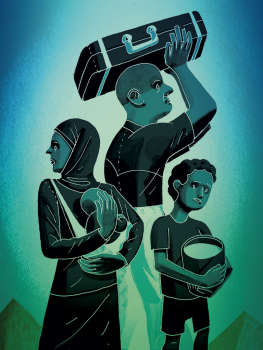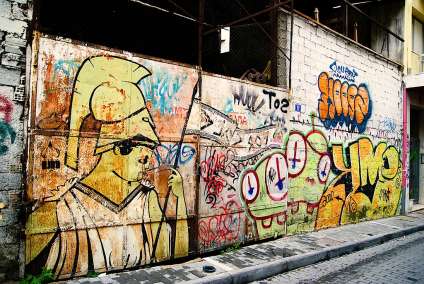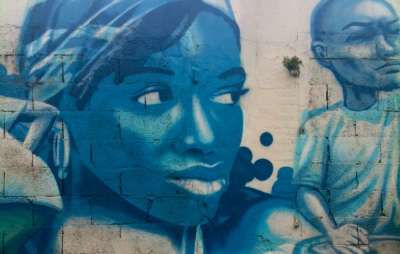During a long drive in the snow to meet my family for the dubiously-founded yet nonetheless celebratory U.S.-American Thanksgiving, my husband Salvatore and I listened to “Serial”, the new podcast by the producers of This American Life. I am sure many Allegra readers have listened to it as well. The series has gone viral, generating more downloads than the entirety of This American Life to date. The podcast, which my father had recommended to me, explores the possible innocence of Adnan, a young Pakistani-American man who received life in prison for allegedly murdering his ex-girlfriend back in 1999. It is indeed riveting (particularly for a long car ride), as the journalist, Sarah Koenig, talks repeatedly with persons close to the case; logs over 30 hours on the phone with Adnan, who speaks to her from prison; and wades through files and recordings of police interviews, trial transcripts, and other pieces from the case. Over dinner that evening, we all debated the question: so do you think he did it? As we weighed the evidence (as mediated and staged by the program, of course), none of us could even begin to speculate about what had “really” happened.  I am only 6 installments in, but I find the series remarkable for how it highlights the impossibilities of producing reliable knowledge about the case: the more knowledge the listeners acquire, the less reliable it becomes. (This, I promise, is relevant to my post here, so bear with me). The vagaries of memory, the inconsistencies of narration, the fear and mistrust many ascribe toward the law and toward journalists, and alongside it all, the sheer difficulty of seeking to know or understand another person are recurrent themes throughout. The journalist reflects critically on these aspects of both the case and her experience, even as she continues to search for some account of the truth.
I am only 6 installments in, but I find the series remarkable for how it highlights the impossibilities of producing reliable knowledge about the case: the more knowledge the listeners acquire, the less reliable it becomes. (This, I promise, is relevant to my post here, so bear with me). The vagaries of memory, the inconsistencies of narration, the fear and mistrust many ascribe toward the law and toward journalists, and alongside it all, the sheer difficulty of seeking to know or understand another person are recurrent themes throughout. The journalist reflects critically on these aspects of both the case and her experience, even as she continues to search for some account of the truth.
The most striking moment for me is when Koenig tells Adnan that he was the key element in her obsession with the case: that he was a “nice guy,” and she didn’t understand how someone like him could have done what they say he did.
In this way, even as she often tested him, she had started to become his advocate. He responds angrily, stating emphatically that she “does not know him” – after all, they have only talked on the phone. Taken aback, she muses to the audience that she has talked to him more than many people she would certainly claim to “know” and who she would even call her friends. He responds later that he would much prefer to be taken seriously for the merit of his case, not because he is charming and likable. But here I want to highlight this point: his insistence that she does not know him. And how the journalist (who at this juncture has begun to seem to me very much an ethnographer, given the depth and extent of her involvement) is reminded in a painful way that even the best intensions, in-depth conversations, and emotional attachment on her part do not make it possible to know the person she is trying to give an account of.
There are many aspects of the series that I find compelling for thinking about the ethnography of asylum and, more broadly, the subfields of political and legal anthropology: the difficulties of constructing a case; the ways in which people remember, mis-remember, or “lie;” the power of stories and narration, which is at the heart of how asylum seekers must produce and perform their refugee-ness in order to acquire protection; and the power of emotion and affect in the context of the law. But what I want to focus on here is the powerful experience of not knowing the subjects of one’s research or advocacy, and how refugee advocates and ethnographers alike confront or negotiate these experiences. My first research project focused on the political asylum procedure in Greece and the everyday politics of encounters between asylum seekers, advocates, and bureaucrats (see Cabot 2014).
The bulk of my fieldwork centered on a specific legal aid NGO in Athens, during a particularly fraught and problematic period, when the Greek asylum process was not only overtaxed but the topic of extensive international and EU level critique (2006-2008).
My book manuscript deals repeatedly with the almost phantasmagorical quality of the knowledge that legal advocates and aid workers produced regarding their beneficiaries; and in turn, how asylum seekers themselves sought to produce knowledge of lawyers, social workers, the state, and bureaucratic processes. But everyone (including I the ethnographer) failed repeatedly at this task, and the important thing here is that we all – through and across radical differences and power asymmetries – most often knew we had failed to know.  Nevertheless, like the journalist in Serial, ethnographers and advocates who work with refugees often find themselves interpellated into a kind of forensic project, even if they seek to avoid it. I certainly was pulled into the dilemmas of NGO workers, who sought to determine whether someone did or did not have a workable case; whether this or that person was credible; or whether they could acquire someone’s trust. Some lawyers would insist that they “didn’t care” if someone was telling the truth – all they cared about was whether they could work with their case.
Nevertheless, like the journalist in Serial, ethnographers and advocates who work with refugees often find themselves interpellated into a kind of forensic project, even if they seek to avoid it. I certainly was pulled into the dilemmas of NGO workers, who sought to determine whether someone did or did not have a workable case; whether this or that person was credible; or whether they could acquire someone’s trust. Some lawyers would insist that they “didn’t care” if someone was telling the truth – all they cared about was whether they could work with their case.
But upon learning that someone had not told the truth, some advocacy lawyers or social workers would express a sense of frustration or betrayal.
Such events were not unlike Adnan’s insistence that you do not know me: moments of disorientation but also reorientation, where the limits and impossibilities of knowing hit home, becoming yet again the ground from which one must work. Thus, judgment, truth, argumentation, and representation were, again and again, haunted by “the ghost of the undecidable” (Derrida 1992) – and the necessity, yet persistent impossibility, of knowing. Speculation and critical reflection on the limits of knowing were thus standard (if certainly often painful) aspects of daily practice among the communities with whom I conducted fieldwork.  I just recently submitted an article about the importance of not knowing in ethnographic work with asylum seekers and refugees. And so I have not knowing on the brain, also thanks to a conversation with Catherine Besteman and others at Colby College’s department of anthropology who read a draft of the piece. Besteman’s recent post in “Savage Minds” asks the question of how to write what we don’t know, as opposed to “what we know” – as we have been taught to do for years. I think it is also relevant and telling that her post reflects on her fieldwork with refugees, containing a powerful and illustrative account of how she was reminded of how little she actually knew a Somali refugee in Lewiston, Maine, years into their acquaintance.
I just recently submitted an article about the importance of not knowing in ethnographic work with asylum seekers and refugees. And so I have not knowing on the brain, also thanks to a conversation with Catherine Besteman and others at Colby College’s department of anthropology who read a draft of the piece. Besteman’s recent post in “Savage Minds” asks the question of how to write what we don’t know, as opposed to “what we know” – as we have been taught to do for years. I think it is also relevant and telling that her post reflects on her fieldwork with refugees, containing a powerful and illustrative account of how she was reminded of how little she actually knew a Somali refugee in Lewiston, Maine, years into their acquaintance.
Now, unlike Besteman, I do not speak Somali (nor Dari, nor Arabic, nor Bangla – though I tried to learn some), and thus cannot even claim to have accessed refugee experiences through shared language or exposure to cultural contexts in countries of origin.
My fieldwork focused instead on aid encounters, and the strange worlds of knowledge and experience constructed through the work of refugee advocacy. And yet, I find it relevant that Besteman – who indeed spent years working in Somalia – also writes of the power of an encounter with not knowing when it comes to ethnographic research with refugees: and how her incapacity to know another was thrown into relief a painful, disorienting, yet reorienting way.
Ethnographic work with asylum seekers and refugees – owing perhaps to the incredible power differentials that shape interactions with these subjects of research and advocacy – profoundly underscore the experience of not knowing: challenging ethnographers and advocates alike to recognize, recoopt, manage, or ignore moments of epistemic crisis.
I would suggest that this contribution is not just relevant for understanding the affective and epistemological aspects of asylum processes, human rights advocacy, and humanitarian aid, but for reorienting and humbling the practice of ethnography itself. One might argue that anthropologists and other social scientists have long wrestled with the ambivalences attached to the production of knowledge, and its tendency toward simplification, exclusion, and other aspects of “epistemic violence” (Spivak 1999). The traditions of ethnographic reflexivity and self-critique, and accompanying debates and experiments regarding form and representation, have emphasized the partialness and limited scope of ethnographic knowledge (Clifford 1988; Clifford et al. 1986; Marcus and Fischer 1999). Yet these elements of self-critique are themselves now increasingly normative aspects of ethnographic writing; further, they may also be accompanied by new truth claims regarding the experiences and voices of ethnographic subjects.
For instance, recent experimental work in anthropology highlights how ethnographic knowledge can and does represent persons who, like migrants and refugees (and prisoners), are most often excluded from dominant configurations of power and knowledge. These claims are based not just on thorough and careful research design but also on sustained, intensive engagement between ethnographers and their interlocutors. For instance, in a recent article (2013b), Didier Fassin recounts how one of the young men he wrote about in his book (Fassin 2013a) said that the book had represented his experience “exactly.” Fassin then cites the depth and duration of his fieldwork with French police and in the neighborhoods that they patrol, possible only thanks to permission granted him by police authorities.
Ethnographers also emphasize intersubjective intimacy and longterm involvement in marginalized life-worlds, which grants an experiential and even empirical legitimacy to their representations.
João Biehl (2005; Biehl and Locke 2010) speaks of his long relationship with Catarina, and the years through which he sought to give account of her suffering and struggle. Elizabeth Povinelli (2011) highlights the years she has spent with Aboriginal groups, her “friends” (2011). Moreover, I too refer to many of my research participants as my “friends,” which itself performs a claim to intimacy, rapport building, and thus “good ethnography.” I want to note that I deeply admire and draw on the work of all of these ethnographers who I cite here. Moreover, ethnographers can and do form relationships with those they seek to study, which does lend depth and power to our work. But all too often, it seems to me, we run the risk of forgetting that the knowledge we recount is merely a finger pointing at the moon, as the Zen koan goes: an indexical trace of the real, not the moon itself. In contrast, mistrust, doubt, indissoluble rifts between self and other: these were the over-riding features of my research on the Greek asylum “crisis” and the advocates who sought, in partial and imperfect ways, to provide assistance to those at the margins of the state and the law.
Ethnographic work on asylum and refugees has the, perhaps counterintuitive, virtue of throwing not knowing into the center of the epistemic projects we carry out. We are rarely allowed to forget that our projects of knowledge production are, in immediate and powerful ways, doomed from the outset.
Further, participants in ethnographic research themselves sometimes reject or complexify these accounts, much as Adnan insists to the journalist/ ethnographer: you don’t know me. Such moments, while painful, are important, disorienting and yet reorienting: they force ethnographers to take seriously again that not knowing, and not being able to know, is in fact the ground from which we must speak.
Works Cited Biehl, Joao. 2005. Vita: Life in a Zone of Social Abandonment. Berkeley and Los Angeles: University of California Press. Biehl, João, and Peter Locke. 2010. “Deleuze and the Anthropology of Becoming.”Current Anthropology 51:317-351. Cabot, Heath. 2014. On the Doorstep of Europe : Asylum and Citizenship in Greece.1st edition. The Ethnography of Political Violence Philadelphia: University of Pennsylvania Press. Clifford, James. 1988. The Predicament of Culture: Twentieth-Century Ethnography, Literature, and Art. Cambridge, MA: Harvard University Press. Clifford, James, George E. Marcus, and School of American Research (Clifford et al.). 1986. Writing Culture: The Poetics and Politics of Ethnography: A School of American Research Advanced Seminar. Berkeley: University of California Press. Derrida, Jaques. 1992. “Force of Law: The Mystical Foundation of Authority.” In Deconstruction and the Possibility of Justice, Cornell, Drucilla, Michel Rosenfield, and David Gray Carlson3-67. London: Routlede. Fassin, Didier. 2013a. Enforcing Order: An Ethnography of Urban Policing Cambridge, UK and Malden, MA: Polity. ___. 2013b. “Why Ethnography Matters: On Anthropology and Its Publics.” Cultural Anthropology 28:621-646. Marcus, George E., and Michael M. J. Fischer. 1999. Anthropology as Cultural Critique: An Experimental Moment in the Human Sciences.2nd edition Chicago: University of Chicago Press. Povinelli, Elizabeth A. 2011. Economies of Abandonment : Social Belonging and Endurance in Late Liberalism. Durham N.C.: Duke University Press. Spivak, Gayatri. 1999. A Critique of Postcolonial Reason: Toward a History of the Vanishing Present. Cambridge: Harvard University press.







